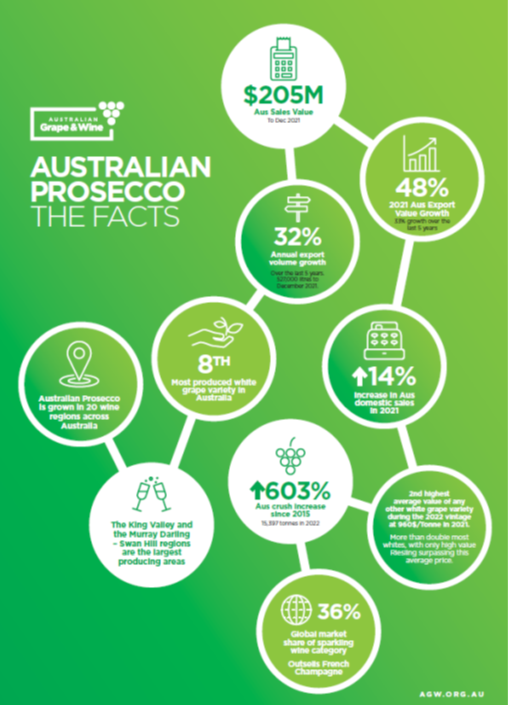Policy & Issues
Prosecco – The Facts
Prosecco is the name of a grape variety used to produce sparkling wine in countries across the world. The International Organisation of Vine and Wine (OIV) recognises Prosecco as a grape variety in its International list of vine varieties and their synonyms – the global reference point for grape variety names.
Prosecco Fast Facts:
- Prosecco is an internationally recognised grape variety.
- Australia’s Prosecco market is booming. Australia is one of the fastest growing sparkling wine markets in the world with the total value of Australian Prosecco production estimated to be $205M.
- The first commercial vineyard in Australia was planted in 1999 and its first vintage was produced in 2004. It is now grown across 20 Australian wine regions.
- It is now the 8th most produced grape variety in Australia gaining on average the second highest average price per tonne of any white grape variety.
- In 2009 the European Union (EU and Italian Government) sought to alter these facts by claiming Prosecco was an EU Geographic Indication (GI) and changing the name of the Prosecco grape variety to ‘Glera’ within the EU.
- Since then, Italy and the EU, are expanding efforts to gain exclusive use of the name Prosecco in other global markets.
- In 2013, the Australian wine industry successfully challenged an EU application to protect Prosecco as a GI in Australia, with Australian Deputy Registrar of Trademarks verifying that Prosecco is a recognised grape variety in Australia.
- Prosecco could be the tip of the iceberg. Attempts have already been made to protect an expanding list of grape varieties including Prosecco, Fiano, Montepulciano, Barbera, Nero d’Avola, Vermentino, Dolcetto, and others as GIs. All of these varieties are grown across Australia’s 65 wine regions.
Resources
Latest Resources
- Final Report – The European Union’s attempts to limit the use of the term ‘Prosecco’ – August 2022 – Prof Mark Davison, Dr Caroline Henckels, Professor Moira Paterson and Dr Lisa Spagnolo Faculty of Law, Monash University & Macquarie Law School, Macquarie University
- ‘The Legality of the European Union’s Potential Attempts to Limit the Use of the Term ‘Nero d’Avola – Final Report’ – April 2024 – Dr Lisa Spagnolo, Dr Caroline Henckels, Prof Mark Davison, Aditya Malik, Debbie Clark, Maxwell Curtis, Adam Bennett, Faculty of Law, Monash University & Macquarie Law School, Macquarie University
General references
- International Organisation of Vine and Wine (OIV), International list of vine varieties and their synonyms.
- OIV Vine Varieties Database
- Jancis Robinson ‘Robinson’s Guide to Wine Grapes Oxford University Press 1996 – Reference material Outlining Prosecco and Montepulciano as grape varieties.
Journal articles
- Journal Article referencing the dubious nature of the EUs attempts to protect Prosecco globally as a grape variety – Davison, Mark, Henckels, Caroline and Emerton, Patrick, In vino veritas? The Dubious Legality of the EU’s Claims to Exclusive Use of the Term “Prosecco””, Australian Intellectual Property Journal (forthcoming in 2019).
- Geographical Indications in the EU, China and Australia, WTO Case Bottling Up Over Prosecco, European Integration and Global Power Shifts: What Lessons for Asia? (Julien Chaisse ed.) 2018/2019, Forthcoming, Peking University School of Transnational Law Research Paper No. 18-14
- Historical References to the grape variety prosecco – Hill, Sam, 2019, dalle uve del vitigno Prosecco – Italian government decrees referring to Prosecco, Monash University
References to Legal Cases
- Reference to the WFA legal case against the European Commission in Australia Decision of the Australian Deputy Registrar of Trademarks which verifies that Prosecco is a recognised grape variety in Australia. – Winemakers’ Federation of Australia v European Commission [2013] ATMOGI 1 (22 November 2013)
- The decision of the High Court of Singapore to deny the application to protect Prosecco as a GI in Singapore based on the fact it was proven to be a recognised grape variety and was likely to mislead consumers if protected as a GI(2021)
- The decision of United States Patent and Trademark Office US to reject the application for protection of Prosecco as a GI based on 438 pieces of evidence that shows that the term Prosecco identifies a Grape Variety, Not a Place of Origin. (2022)
Articles
- Australian Grape & Wine article – The Prosecco GI Lie (February 2020)
- Australian Grape & Wine article – First Prosecco, Now Vermentino. What’s Next…? (September 2022)
- VinePair Inc – Recent objective article which clearly sets out the facts of the debate (2023)

